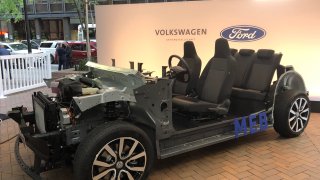
- Volkswagen is expanding its electric-vehicle collaboration with Ford Motor, the company said Monday, signing on to supply the EV architecture for a second Ford model for the European market.
- Ford said it now expects to produce 1.2 million electric vehicles using Volkswagen's platform over six years, starting in 2023 — double its previous production plans.
- Ford and Volkswagen first announced a broad collaboration on electric and autonomous vehicles in 2019.
Volkswagen is expanding its electric-vehicle collaboration with Ford Motor, the company said Monday, signing on to supply the EV architecture for a second Ford model for the European market.
As part of the expansion, Ford said it now expects to produce 1.2 million electric vehicles using Volkswagen's platform over six years, starting in 2023 — double its previous production plans.
The news was part of a broader Ford plan for electric vehicles in Europe announced earlier on Monday.
Get San Diego local news, weather forecasts, sports and lifestyle stories to your inbox. Sign up for NBC San Diego newsletters.
"Profitability and speed are now crucial for finally achieving the breakthrough of e-mobility in Europe. We are tackling both together with Ford," said Thomas Schmall, who runs VW's components business.
Ford and Volkswagen first announced a broad collaboration on electric and autonomous vehicles in 2019. The partnership has since expanded to include joint efforts on internal-combustion commercial vehicles and a $2.6 billion investment by Volkswagen in Argo AI, a Ford-backed self-driving startup based in Pittsburgh.
Historically it's very unusual for two global automakers to collaborate at this depth. But such collaborations have become more common in recent years as automakers grapple with the costs and resources needed to transition to zero-emissions vehicles with higher levels of automation.
Money Report
General Motors and Honda have a similar partnership, under which Honda invested in GM's self-driving subsidiary, Cruise, and committed to using GM's electric-vehicle technology in two upcoming Honda models for the U.S. market. The two automakers have collaborated on hydrogen fuel cells since 2013, and more recently set up a joint venture to mass-produce fuel cells in Michigan. But Honda last year stepped away from a longer-term plan to use GM's EV architecture and said that it will develop its own for new models coming later this decade.
The first Ford model to use Volkswagen's EV architecture will be a battery-electric crossover SUV, expected to begin shipping next year. Ford hasn't yet released details about the second planned model.
Both will be built at Ford's manufacturing complex in Cologne, Germany.






